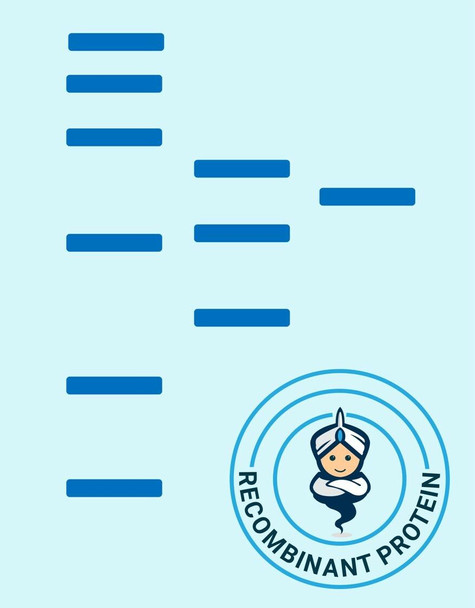Description
| Product Name: | Human HGF Recombinant Protein |
| Product Code: | RPPB0370 |
| Size: | 10µg |
| Species: | Human |
| Target: | HGF |
| Synonyms: | Scatter Factor (SF), Hepatopoietin (HPTA), HGF. |
| Source: | Chinese Hamster Ovary Cells (CHO) |
| Physical Appearance: | Sterile Filtered White lyophilized (freeze-dried) powder. |
| Formulation: | The protein was lyophilized from a concentrated (292�g/ml) solution containing Phosphate-Buffered Saline with 0.02% Tween 80, pH 7.4. |
| Solubility: | It is recommended to reconstitute the lyophilized Hepatocyte Growth Factor in sterile 18M?-cm H2O not less than 100�g/ml, which can then be further diluted to other aqueous solutions. |
| Stability: | Lyophilized Hepatocyte Growth Factor although stable at room temperature for 3 weeks, should be stored desiccated below -18°C. Upon reconstitution HGF should be stored at 4°C between 2-7 days and for future use below -18°C.For long term storage it is recommended to add a carrier protein (0.1% HSA or BSA).Please prevent freeze-thaw cycles. |
| Purity: | Greater than 97.0% as determined by�SDS-PAGE. |
| Biological Activity: | The ED50, calculated by the dose-dependant proliferation of monkey 4MBr-5 indicator cells was found to be 20-40 ng/ml. |
Hepatocyte Growth Factor (HGF) is a multifunctional growth factor which regulates both cell growth and cell motility. It exerts a strong mitogenic effect on hepatocytes and primary epithelial cells. HGF synergizes with Interleukin-3 and GM-CSF to stimulate colony formation of hematopoietic progenitor cells in vitro and may, therefore, also modulate hematopoiesis.
Hepatocyte Growth Factor Human Recombinant produced in CHO is a heterodimer, non-glycosylated, polypeptide chain consisting an a-chain of 463 amino acids and b-chain of 234 having a total molecular mass of approximately 75kDa. The HGF is purified by proprietary chromatographic techniques.�
| UniProt Protein Function: | HGF: HGF is a potent mitogen for mature parenchymal hepatocyte cells, seems to be an hepatotrophic factor, and acts as growth factor for a broad spectrum of tissues and cell types. It has no detectable protease activity. Activating ligand for the receptor tyrosine kinase MET by binding and promoting its dimerization. Defects in HGF are the cause of deafness autosomal recessive type 39 (DFNB39). A form of profound prelingual sensorineural hearing loss. Sensorineural deafness results from damage to the neural receptors of the inner ear, the nerve pathways to the brain, or the area of the brain that receives sound information. Belongs to the peptidase S1 family. Plasminogen subfamily. 6 isoforms of the human protein are produced by alternative splicing. |
| UniProt Protein Details: | Protein type:Motility/polarity/chemotaxis; Hormone; Cell development/differentiation Chromosomal Location of Human Ortholog: 7q21.1 Cellular Component: extracellular space; membrane; extracellular region Molecular Function:identical protein binding; protein binding; growth factor activity; protein heterodimerization activity; serine-type endopeptidase activity; chemoattractant activity Biological Process: positive regulation of myelination; mitosis; platelet activation; organ regeneration; activation of MAPK activity; myoblast proliferation; hepatocyte growth factor receptor signaling pathway; negative regulation of caspase activity; proteolysis; liver development; positive regulation of phosphoinositide 3-kinase cascade; positive regulation of osteoblast differentiation; positive regulation of peptidyl-tyrosine phosphorylation; positive regulation of angiogenesis; platelet degranulation; positive chemotaxis; epithelial to mesenchymal transition; positive regulation of transcription from RNA polymerase II promoter; blood coagulation; hyaluronan metabolic process; positive regulation of cell migration Disease: Deafness, Autosomal Recessive 39 |
| NCBI Summary: | Hepatocyte growth factor regulates cell growth, cell motility, and morphogenesis by activating a tyrosine kinase signaling cascade after binding to the proto-oncogenic c-Met receptor. Hepatocyte growth factor is secreted by mesenchymal cells and acts as a multi-functional cytokine on cells of mainly epithelial origin. Its ability to stimulate mitogenesis, cell motility, and matrix invasion gives it a central role in angiogenesis, tumorogenesis, and tissue regeneration. It is secreted as a single inactive polypeptide and is cleaved by serine proteases into a 69-kDa alpha-chain and 34-kDa beta-chain. A disulfide bond between the alpha and beta chains produces the active, heterodimeric molecule. The protein belongs to the plasminogen subfamily of S1 peptidases but has no detectable protease activity. Alternative splicing of this gene produces multiple transcript variants encoding different isoforms. [provided by RefSeq, Jul 2008] |
| UniProt Code: | P14210 |
| NCBI GenInfo Identifier: | 123116 |
| NCBI Gene ID: | 3082 |
| NCBI Accession: | P14210.2 |
| UniProt Secondary Accession: | P14210,Q02935, Q13494, Q14519, Q3KRB2, Q8TCE2, Q9BYL9 Q9BYM0, Q9UDU6, A1L3U6, |
| UniProt Related Accession: | P14210 |
| Molecular Weight: | 728 |
| NCBI Full Name: | Hepatocyte growth factor |
| NCBI Synonym Full Names: | hepatocyte growth factor (hepapoietin A; scatter factor) |
| NCBI Official Symbol: | HGF�� |
| NCBI Official Synonym Symbols: | SF; HGFB; HPTA; F-TCF; DFNB39�� |
| NCBI Protein Information: | hepatocyte growth factor; hepatopoeitin-A; hepatopoietin-A; lung fibroblast-derived mitogen; fibroblast-derived tumor cytotoxic factor |
| UniProt Protein Name: | Hepatocyte growth factor |
| UniProt Synonym Protein Names: | Hepatopoietin-A; Scatter factor; SF |
| Protein Family: | Hepatocyte growth factor |
| UniProt Gene Name: | HGF�� |
| UniProt Entry Name: | HGF_HUMAN |








